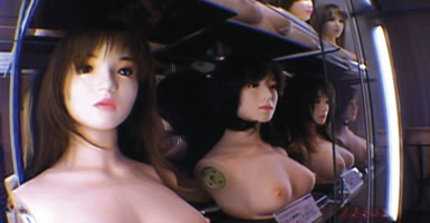Sci-Fi London 2012: THE MECHANICAL BRIDE Review

De Fren presents a series of interviews with subjects who range from inventors, photographers, scholars, and even a collector or two of these dolls, on the how, and most importantly the why. The technology is advancing to the point where these dolls, while clearly never able to completely replicate the look and feel of a real woman, are coming far and far closer, both in texture and movement. The inventors and manufacturers show the extensive range of their creations, how customers can customize body shape, skin and hair colour, make-up, and perhaps some variations on anatomy to satisfy their particular desires. A photographer discusses her work in capturing the images of these dolls, and how her encounters with collectors has left her more sympathetic than she would have imagined. De Fren also profiles two Japanese collectors whose homes are filled with their dolls and their wardrobes, and two American men who each have a single doll, not so much for sex as for companionship.
While Julie Newmar (who played a futuristic robot/sex toy in the 1960s TV series My Living Doll) narrates, the film is definitely not subjective or judgemental on any of the subjects. Rather, it presents the facts and feelings in a straightforward manner, so the audience might form their own questions and opinions. This is important for such a strange and somewhat taboo subject. Why do so many men (and she makes a point of noting that it is overwhelmingly straight men; most manufacturers have only one or two male dolls, and these are mostly purchased by men) want these dolls, rather than a real woman? Is it simply one extension of the perception of women as objects, and the notion of male ownership of the female? Or do some of these men simply feel inadequate, unable to speak to a real woman, and thereby find solace in the silent woman onto whom they can project?
The non-judgemental presentation does allow for some sympathy, especially for one of the interviewees, an old man who seems to be looking for some kind of body to replace the space left by his deceased wife in the his bed (so not so much a sex toy, as a physical form in his last years of loneliness.) Another doll enthusiast, David, is remarkably open about his doll, which he takes everywhere and which he constantly refers to as having her own thoughts and desires. But it is hard not to be terrified at the prospect of technological advancement allowing for this kind of, let's face it, Stepford Wife becoming a reality. You cannot escape that these are female dolls made for men, as a replacement, further objectifying women as merely a set of parts to be ordered and owned. Obviously, this is a film that by its very subject matter, men and women will likely view very differently. But as one interviewee points out, sex with these dolls is not the real thing. I found myself sinking farther and farther into my seat, despairing for a technology that would seem to allow the worst parts of sexism to become a reality. The Mechanical Bride, by its subject and presentation, might better be classified a brilliant horror film.

Do you feel this content is inappropriate or infringes upon your rights? Click here to report it, or see our DMCA policy.






